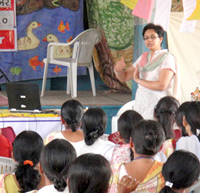To commemorate the Golden Jubilee year, the Trust had decided to embark on a new long term educational project for the underprivileged children of the city. The objective of this Anganwadi project is to provide educational support for three years to deserving children at very formative years of pre-primary and primary education. As a part of the Integrated Women and Child Development Scheme of the Central Government, ‘Angadwadi’ centers are run in the slum areas of the city. There are about 300 such centers catering to about 30,000 children of the slums area. The main area of operation of the Anganwadi centers is health and nutrition of women and children. Each Anganwadi has one main care taker and one helper. Their educational qualification of caretakers and helpers ranges from Matriculation to graduation. These caretakers are not equipped to provide basic education and training to young children.

Children in the age group up to six years attend the Anagnwadi between 11.00 a.m. to 3.00 p.m. every day. These Angadwadi’s generally operate in a rented/kuccha structures with inadequate infrastructure and resources. At the age of six years, the children attending Anganwadi are expected to take admissions generally in municipal schools. However, it is noticed that the dropout rate from Anganwadi to municipal schools is quite high. This is indeed an alarming situation as a very large section of the underprivileged children do not opt for formal education.
BLCET based on its study has realized that the caretakers managing Anganwadi are not formally trained in child psychology and providing basic education and training to young children who attend the Anganwadi at a very tender age. It was felt that if the caretakers are properly trained in providing basic education to the young children, it would make a substantial difference in nurturing the talent among the young children. Given the right training, these teachers can “ignite the passion for education” in the young children. BLCET ran a pilot training programme for the caretakers and the response has been extremely positive. BLCET found the caretakers to be very enthusiastic and talented. After detailed deliberations, BLCET has drawn the roadmap of the first phase of the programme as under:
- To provide regular training to caretakers of the Angandwadi during the financial year 2010-11 with the objective of bringing the best out of them and convert them from merely being caretakers to ‘teachers’ who can provide motivation and basic pre-primary education. For achieving this goal, a workshop of 8 days was conducted in the month of March for the Anganwadi teachers and then 4 days workshop was conducted for helper teachers. Accordingly a 12 units booklet was developed and distributed to these Anganwadi teachers.
- A Team of experienced teachers work on the project throughout the year and monitor progress and provide regular inputs to the Anganawadi teachers. We have selected four teachers who regularly visit there anganawadi’s supervisors and provide guidance to the Anganawadis.
Now we are in the process of developing next booklet for the next 3 months. The same will be given to them while having one day workshop. Similarly the rest 2 sets of booklets consisting of 12 units material will be prepared and given to teachers after conducting the workshops.













